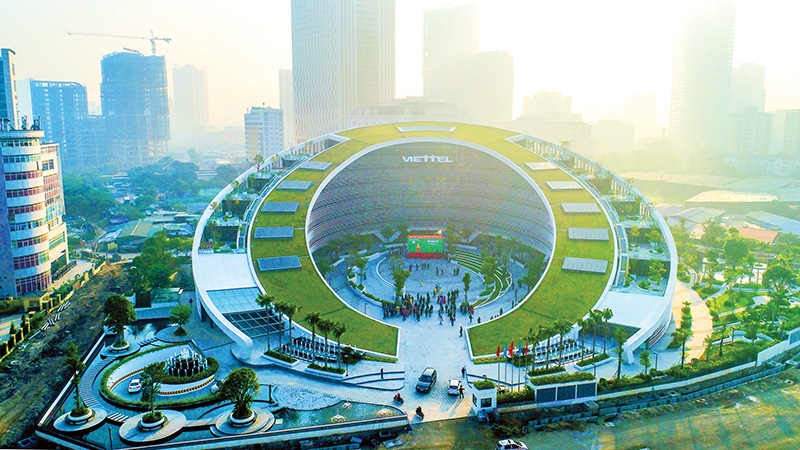SOEs chosen to lead sector growth
 |
| Viettel, VNPT, and MobiFone are among the chosen SOEs for the new scheme. Photo: Le Toan |
The Ministry of Planning and Investment (MPI) plans to include seven substantial state-owned enterprises (SOEs) with a combined total asset value of over VND20 trillion ($869.57 million) for the pilot project on positioning a handful of giant SOEs to fuel the growth of other stakeholders in their respective sectors.
According to the initial proposal, three high-tech groups (Viettel, VNPT, and MobiFone), two energy groups (Electricity of Vietnam and PetroVietnam), the seaport and logistics operator Saigon Newport Corporation, and commercial banking giant Vietcombank were picked for the initiative.
These seven fit the bill in terms of having registered capital of over VND1.8 trillion ($78.26 million); having at least 30 per cent share of their prospective markets with the potential to expand this to a controlling stake; having an efficient corporate governance model; and applying high technology throughout their operations. Besides that, they operate in fields with high spillover effects.
While the pilot will feature these SOEs, the plan is to have a total of 17 groups and corporations once the programme is fully underway.
Developing the SOE ecosystem was set as a crucial task by the closing resolution of the recent 13th National Party Congress, which outlined the country’s main development directions.
MPI Minister Nguyen Chi Dung emphasised that throughout their participation in the project, “selected SOEs must become true leaders, guiding others. Each of them must become an innovation centre from which others can learn. Besides that, they will have to build an ecosystem and a value chain to support private enterprises.”
Le Manh Hung, director of the MPI’s Enterprises Development Agency, said that the target of the leadership and guidance to be offered by these SOEs will be to create closer links with the private sector, make way for new sectors, improve technology adoption, and promote domestic innovation.
The pilot project outlines orientations for each participating SOE to ensure they can fulfil the role meant for them.
Notably, plans for PetroVietnam include bolstering its already impressive financial and technological potential as well as competitiveness and its capacity to promote international integration. At the same time, within 2025-2030, PetroVietnam will take up a majority share in the domestic oil and gas market and achieve a stature on par with leading oil and gas groups from Thailand and Malaysia.
Meanwhile, Viettel will be a dynamic and modern economic group and set out to become a global group – while remaining a key player in Vietnam’s defence development.
MobiFone will reinforce its position as a key national telecommunications operator while deploying new technologies to develop mobile services, focusing on data, integrated, and value-added services.
“The proposal also requests policies to facilitate these SOEs by encouraging the development of digital services, the establishment of a technology development fund for Viettel, and mechanisms to support port clusters. In the finance-banking sector, there will be mechanisms to promote investment banking and set up investment funds, including venture capital funds,” Hung said.
Nguyen Quang Dong, director of the Institute for Policy Studies and Media Development, said that prioritising the development of the defence industry and promoting Viettel’s role is reasonable. However, he called for caution in selecting enterprises in the sectors of energy, telecommunications, banking, and logistics. Recalling the previous failure of large-scale state-owned groups like Vinalines or Vinashin, he stressed that SOEs can only develop with competition.
“These guides will have to be clear on their role as the builders of the foundations and infrastructure that will allow the development of other stakeholders in the economy. Their focus cannot be on simply dominating the market,” Dong said. “The development of SOEs will have to result in the optimisation of the use of state power. Thus, the MPI proposal needs a clause urging SOEs to develop basic infrastructure to promote the development of digital technology.”
Dong also asked why no agricultural SOE is included in the proposed pilot, despite this sector being a particular strength of Vietnam that is also vulnerable to fluctuations.
Reacting to feedback, Minister Dung said that the MPI will continue carefully studying the pilot project proposal before submitting it to the prime minister for approval soon.
What the stars mean:
★ Poor ★ ★ Promising ★★★ Good ★★★★ Very good ★★★★★ Exceptional
Related Contents
Latest News
More News
- State corporations poised to drive 2026 growth (February 03, 2026 | 13:58)
- Why high-tech talent will define Vietnam’s growth (February 02, 2026 | 10:47)
- FMCG resilience amid varying storms (February 02, 2026 | 10:00)
- Customs reforms strengthen business confidence, support trade growth (February 01, 2026 | 08:20)
- Vietnam and US to launch sixth trade negotiation round (January 30, 2026 | 15:19)
- Digital publishing emerges as key growth driver in Vietnam (January 30, 2026 | 10:59)
- EVN signs key contract for Tri An hydropower expansion (January 30, 2026 | 10:57)
- Vietnam to lead trade growth in ASEAN (January 29, 2026 | 15:08)
- Carlsberg Vietnam delivers Lunar New Year support in central region (January 28, 2026 | 17:19)
- TikTok penalised $35,000 in Vietnam for consumer protection violations (January 28, 2026 | 17:15)

 Tag:
Tag:




















 Mobile Version
Mobile Version